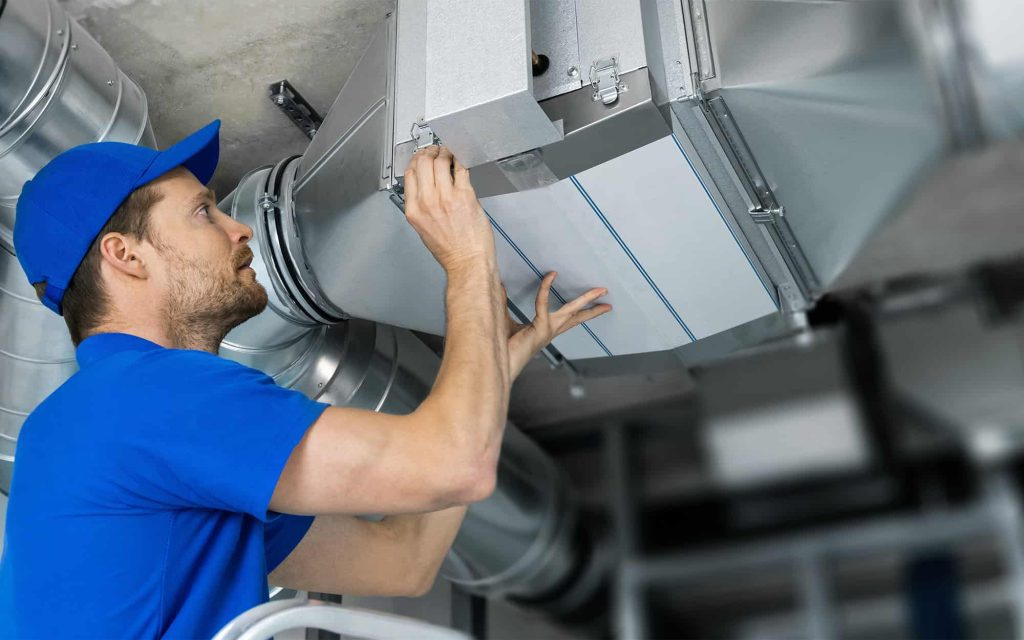Indoor air quality (IAQ) is vital for a healthy home or workplace, and HVAC systems play a key role in maintaining it. Poorly managed systems can harm IAQ, while proper maintenance can improve it. This blog discusses the link between HVAC systems and IAQ, the risks of neglect, and tips for creating a healthier environment.
Understanding HVAC Systems and Their Role in Air Quality
An HVAC system does more than just heat or cool a space. It filters, circulates, and regulates indoor air, making it a powerful tool for maintaining air quality. However, its effect on IAQ depends on various factors, including system design, maintenance practices, and daily use.
The Good News
When functioning optimally, HVAC systems can:
- Filter out pollutants: Advanced filtration systems can capture allergens such as dust, pollen, and pet dander, improving respiratory health.
- Regulate humidity: Properly maintained systems help balance indoor humidity, reducing risks of mold and mildew.
- Support ventilation: By circulating outdoor air, a well-designed HVAC system dilutes indoor pollutants and replenishes oxygen levels.
The Risk Factors
Despite their benefits, HVAC systems can also negatively affect IAQ if not properly managed. Common risks include:
- Poor Maintenance: A neglected system can circulate dust, allergens, and even mold throughout your space.
- Dirty Air Filters: Clogged or outdated filters reduce filtration efficiency, allowing pollutants to recirculate.
- Improper Humidity Levels: HVAC units without proper dehumidifiers may lead to excess moisture, creating an environment ripe for mold growth.
- Volatile Organic Compounds (VOCs): Some systems release VOCs from components, contributing to indoor air pollution.
Understanding these factors is the first step in addressing how your HVAC system could be impacting your IAQ.
Common HVAC Problems That Affect Indoor Air Quality
What exactly can go wrong with an HVAC system, and how does it affect the air you breathe? Here are a few common issues:
1. Dirty or Old Filters
Air filters are essential for trapping contaminants. However, when filters are not replaced on schedule, they can become clogged and ineffective. Worse, they may release accumulated particles back into your living or workspaces.
2. Mold and Mildew in Ducts
If your HVAC system lacks regular cleaning, moisture can build up in air ducts, leading to mold and mildew growth. These contaminants are then blown through vents, diminishing IAQ and putting occupants at risk of respiratory conditions.
3. Insufficient Ventilation
Outdated or poorly designed systems often fail to circulate fresh outdoor air effectively. This can lead to a buildup of indoor pollutants, including chemical fumes, off-gassing from furniture, and cooking emissions.
4. Leaks in Ductwork
Leaks in air ducts not only waste energy but also allow pollutants from unconditioned spaces (e.g., attics or basements) to bypass filters and enter the breathing zone.
5. Improper Sizing
An HVAC system that’s too large or too small for the space will struggle to maintain proper airflow and humidity levels. This can create hotspots for pollutants and reduce overall air circulation.
Steps to Improve Indoor Air Quality Through Your HVAC System
Fortunately, there are steps you can take to ensure your HVAC system contributes positively to your IAQ. Here’s how you can optimize maintenance and use:
1. Replace Air Filters Regularly
The simplest and most effective way to maintain good air quality is to replace your air filters on a regular schedule. High-quality filters with a minimum MERV rating of 8 are recommended for general purposes, but you might consider HEPA filters if allergies are a concern.
2. Schedule Routine Maintenance
Have your HVAC system inspected and serviced by a professional at least twice a year. They can clean components, check for leaks, and ensure the system is running efficiently. For specialized services like AC repair, look for experts in your area, such as those in Salt Lake City.
3. Use UV Light Technology
UV lights installed in your HVAC system can kill mold, bacteria, and viruses before they recirculate through your air ducts, providing an added layer of protection.
4. Invest in a Dehumidifier
If your home or workspace frequently experiences high humidity levels, consider adding a dehumidifier to your HVAC system. This reduces the risk of mold growth and helps maintain the ideal indoor humidity level of 30-50%.
5. Upgrade Ventilation
Ensure your system incorporates fresh air intake to prevent the buildup of indoor pollutants. If your current system isn’t designed for this, consider standalone air exchangers or ventilators.
6. Monitor Indoor Air Quality
Invest in IAQ monitoring devices that measure levels of pollutants, humidity, and particulate matter. These devices can give you valuable insights into how your HVAC system is performing and where it needs improvement.
7. Seal Leaky Ductwork
Prevent pollutants from entering your air supply by sealing any leaks in the ductwork. Proper sealing also enhances energy efficiency, reducing costs over time.
How Your Behavior Affects Indoor Air Quality
Your HVAC system is just one piece of the puzzle. Other everyday habits can also influence IAQ, such as:
- Avoiding smoking indoors
- Using low-VOC paints and cleaning products
- Properly ventilating while cooking
- Keeping pets clean and well-groomed
Combining these habits with an optimized HVAC system can transform the quality of air in your indoor space.
The Long-Term Benefits of Investing in HVAC and IAQ Solutions
Taking a proactive approach to maintaining your HVAC system has far-reaching benefits:
- Healthier Occupants: Improved IAQ reduces respiratory issues, allergies, and irritants.
- Energy Efficiency: A well-maintained system operates more efficiently, saving money on energy bills.
- Longevity of Equipment: Regular servicing extends the life of your HVAC system, minimizing repair and replacement costs.
- Environmental Impact: Reduced energy usage and proper ventilation contribute to a smaller carbon footprint.
By prioritizing the health of your HVAC system, you’re investing in your comfort, health, and pocketbook.
Conclusion
Now that you understand the connection between your HVAC system and IAQ, it’s time to take action. Schedule routine maintenance, replace air filters regularly, and invest in solutions like UV lights and dehumidifiers to improve air quality.


